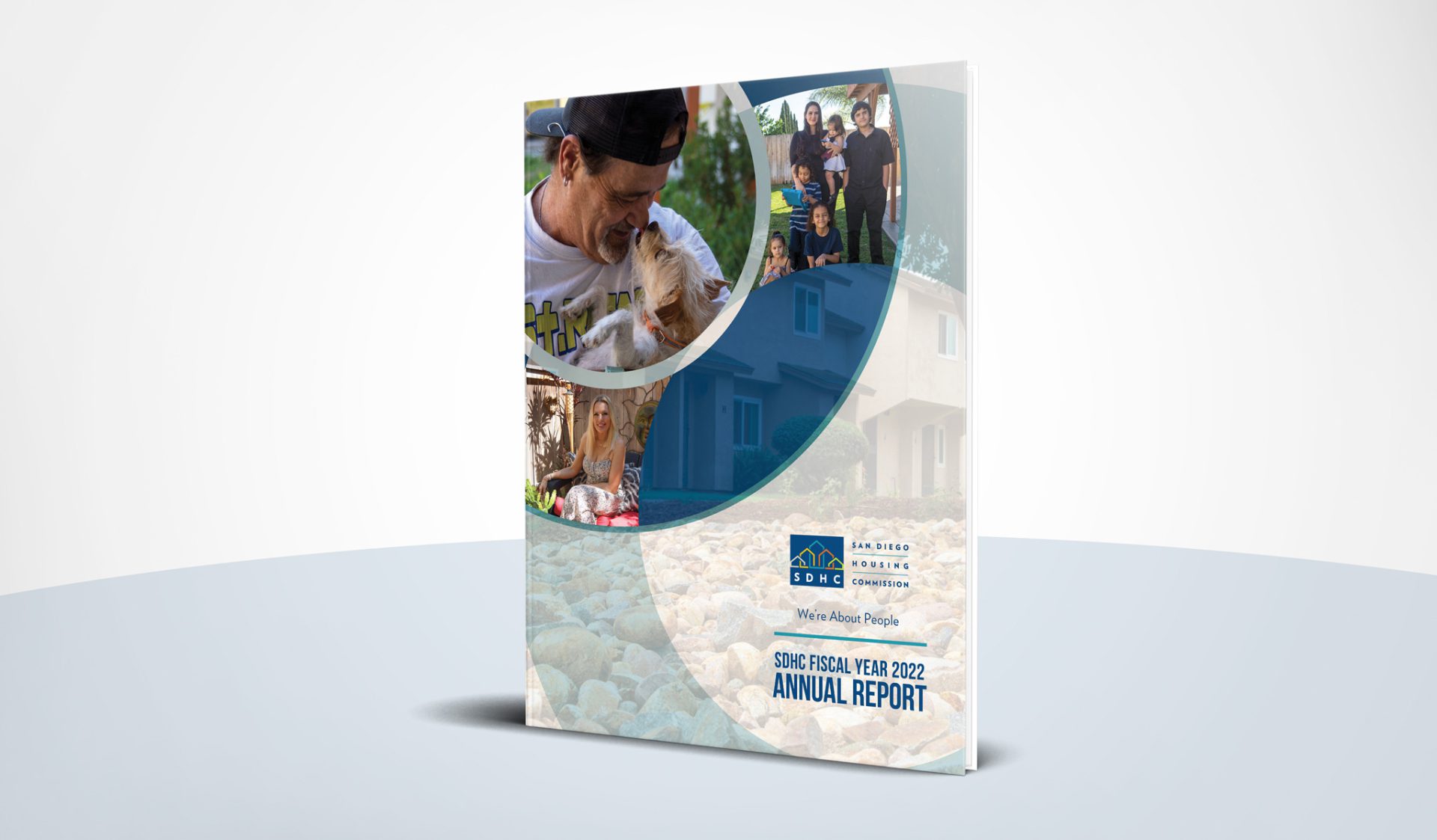November 3, 2022
Stories of Positive Impact: SDHC’s Fiscal Year 2022 Annual Report Features People the Agency Helped with Housing Assistance
Multimedia report includes personal stories, videos, data, graphics and program descriptions
San Diego, CA — A medical technician and a teacher who, with their children, receive help with their rent and look forward to buying a home. A grandmother who experienced homelessness before moving into an affordable rental housing development. A mother who achieved the dream of homeownership for her and her son.
Sharing their stories in the San Diego Housing Commission’s (SDHC) Fiscal Year 2022 (July 1, 2021 – June 30, 2022) Annual Report, published online today, they are among thousands of households with low income in the City of San Diego who received housing assistance from SDHC during the fiscal year.
“The San Diego Housing Commission’s motto is, ‘We’re About People.’ And one of our core values as an agency is to serve our clients with equity, dignity and respect. That is clear in the pages of this Annual Report,” SDHC Interim President & CEO Jeff Davis said. “We value and appreciate the many organizations that work with us, the outstanding Housing Commission staff, and the leadership of Mayor Todd Gloria, the City Council and the Housing Commission’s Board of Commissioners, all of which makes it possible to have a positive impact on the families we serve.”
SDHC’s Annual Report is published online. It includes links to videos, written profiles, data, infographics and descriptions of SDHC’s programs, which provide housing assistance and opportunities for increased self-reliance for families and individuals with low-income or experiencing homelessness in the City of San Diego.
For example, Thomas, a medical technician, Karolina, a teacher, and their children are one of the 19,687 households that received federal rental assistance from SDHC during Fiscal Year 2022. Rental assistance is SDHC’s largest program. Thomas described SDHC as a place to grow while receiving housing security for his family.
During Fiscal Year 2022, SDHC also continued its administration of the COVID-19 Housing Stability Assistance Program, which helped pay rent and utilities for households with low income that experienced financial hardship due to or during the pandemic. At its conclusion, the program had paid more than $218 million to help more than 18,300 qualifying households. Laura, who works in radio, was able to keep her longtime rental home in Hillcrest with help from this program.
Veronica experienced homelessness during the pandemic. She was able to move into an affordable rental home of her own with SDHC helping to pay her rent at a development built with funding that included an SDHC loan. She now has room to work, relax, host her grandchildren and focus on her goal of helping others.
Veronica’s rental housing unit is one of the more than 10,600 housing solutions created since 2014 through HOUSING FIRST – SAN DIEGO, SDHC’s homelessness action plan. It is also among the additional permanent housing units with supportive services needed for people experiencing homelessness, as identified in the Community Action Plan on Homelessness for the City of San Diego.
During Fiscal Year 2022, nearly 1,000 affordable rental housing units were completed and more than 2,300 units had been approved and were pending completion with SDHC’s participation. Keeler Court apartments was among the completed developments, providing a rental home for Todd, a military veteran who experienced homelessness and said he is “honored” and “humbled” to have received the help he did. SDHC helps Todd pay his rent through a Veterans Affairs Supportive Housing (VASH) voucher. SDHC also supported the Keeler Court development by authorizing Multifamily Housing Revenue Bonds to finance the project.
SDHC supports the creation and preservation of affordable housing by providing financing to developers, owning and operating affordable rental housing properties, and administering City of San Diego land use programs, such as inclusionary housing. When SDHC participates in a rental housing development, the rents are required to remain affordable for decades—typically 55 years—for households at specified levels of low income.
Households with low income, such as Beatriz and her son, also achieved the dream of homeownership through SDHC’s First-Time Homebuyer Program. In addition to the City of San Diego’s First-Time Homebuyer Program, SDHC administers the County of San Diego’s program and received approval in May to administer first-time homebuyer programs for the cities of Chula Vista and El Cajon.
Additional initiatives highlighted in the Annual Report include:
- Legislative affairs, including advocacy for legislation that could affect the individuals and families SDHC’s programs serve, as well as policy recommendations to address a variety of issues.
- Efforts that advanced SDHC’s commitment to equity and inclusivity.
- Emergency Housing Vouchers that assist households experiencing homelessness or at risk of homelessness.
- The SDHC Achievement Academy’s collaborations with private-sector partners on workforce readiness programs.
- Pilot programs to support the creation of accessory dwelling units for households with low income.
SDHC’s Annual Report is produced in-house by the agency’s award-winning Communications & Government Relations Division.
###
Media Contact:
Scott Marshall
Vice President of Communications
San Diego Housing Commission
619-578-7138

